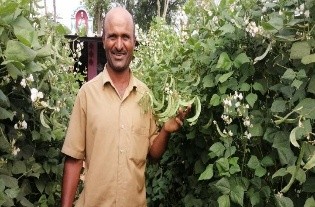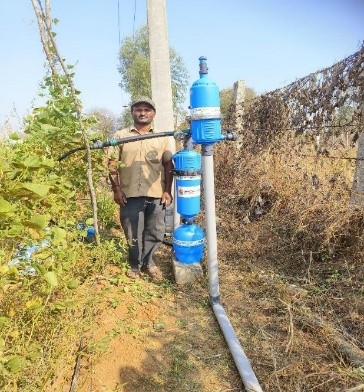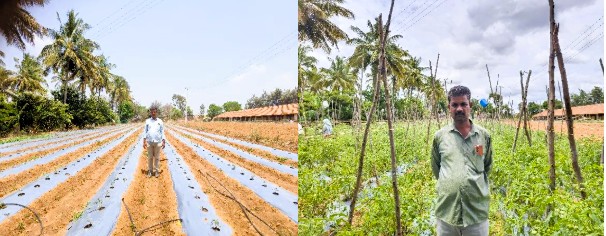With the precise and efficient delivery of water to the plant roots, his crop health significantly improved — leading to a yield of 21 tonnes, compared to the 17.5 tonnes he previously harvested with traditional irrigation.
Saving Water, Growing More: Muni Swamy Rao’s Success with Drip Irrigation
Chaithra, P.M and Chethan, K S | S M Sehgal Foundation
 Muni Swamy Rao depends on agriculture as his primary source of income. The family cultivates vegetables such as tomato, chili, cabbage, hyacinth bean, and others on their three-acre land using borewell water. However, the high cost of modern irrigation system had long kept efficient water management out of reach for the family.
Muni Swamy Rao depends on agriculture as his primary source of income. The family cultivates vegetables such as tomato, chili, cabbage, hyacinth bean, and others on their three-acre land using borewell water. However, the high cost of modern irrigation system had long kept efficient water management out of reach for the family.
Due to limited resources, Muni Swamy Rao depended on traditional surface irrigation methods, which often led to water wastage and lower crop yields. S M Sehgal Foundation team, under the CSR project supported by First American (India), selected him as a beneficiary for the drip irrigation initiative under the program supporting small and marginal farmers.
 A drip irrigation system was installed on one acre of his land. Muni Swamy Rao chose to grow hyacinth bean (sem) on half an acre of this irrigated area. With the precise and efficient delivery of water to the plant roots, his crop health significantly improved — leading to a yield of 21 tonnes, compared to the 17.5 tonnes he previously harvested with traditional irrigation.
A drip irrigation system was installed on one acre of his land. Muni Swamy Rao chose to grow hyacinth bean (sem) on half an acre of this irrigated area. With the precise and efficient delivery of water to the plant roots, his crop health significantly improved — leading to a yield of 21 tonnes, compared to the 17.5 tonnes he previously harvested with traditional irrigation.
“I couldn’t afford drip irrigation on my own, but now I see how much difference it makes. It is water-efficient, saves cost and time, in addition to an increase in yields, leading to greater prosperity,” says Muni Swamy Rao.
Another farmer, Ramesh faced a different set of challenges. He is a dedicated farmer living with his wife and children, relies entirely on agriculture to support his family. Owning 4 acres of land, he cultivates a variety of vegetables. With a borewell as his primary source of water, Ramesh has always worked hard to make the most of his land. However, like many small-scale farmers, he faced challenges in maximizing crop yields due to limited access to advanced agricultural practices and inputs.
Recognizing his potential and need, S M Sehgal Foundation, with the support of First American (India), selected Ramesh as a beneficiary for the Package of Practices (PoP) initiative. This initiative aims to promote Integrated Nutrient Management (INM) for improved soil health and enhancing crop productivity sustainably.

As part of the initiative, Ramesh received a comprehensive package that included micronutrients, insecticides, fungicides, and organic manure. Alongside the inputs, the Sehgal Foundation team provided technical guidance throughout the crop cycle from sowing to harvest, ensuring that best practices were followed at every stage.
Ramesh applied the POP to his tomato crop, and the results were outstanding. Where his traditional practices had yielded 14.5 tonnes per acre, the new approach led to an impressive 19 tonnes per acre. This increase boosted his income and also reinforced the value of balanced nutrient management.
Ramesh shared, “I am very happy with the increase in yield. The support and guidance from the project team have made a big difference. I will continue using this method and share it with other farmers as well.”
The content & opinions in this article are the author’s and do not necessarily represent the views of AgriTechTomorrow
Comments (0)
This post does not have any comments. Be the first to leave a comment below.
Featured Product

